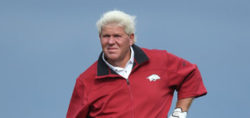David Feherty: On Comedy And Tragedy

David Feherty is a complicated mix of stand-up comedian, probing interviewer, entertaining golf broadcaster, recovering addict and incessant worker. He seamlessly changed from struggling pro golfer to an immediate hit on CBS golf coverage. I first saw David in the mid-90’s as he broke down at his locker at the Byron Nelson Championship after another missed cut and right before CBS rescued him by tapping the quick-wit for future stardom.
John Feinstein caught up with the golf court jester’s first public interview since his son Shea took his life earlier this year. It’s a must-read for anyone who follows golf and/or is battling their own demons.
Twenty-four nights a year, Feherty does his act—three nights a week on eight occasions. He does an hour and 40 minutes of straight stand-up, pausing only occasionally for brief sips of iced tea. The stand-up is his life story—told as only he can tell it. It includes a good deal of bathroom humor, plenty of profanity and some poignant moments, especially when he talks about his parents and his wife, Anita.
Feherty has an agreement that he doesn’t have to work Masters Week.
“I never felt comfortable there,” he says. “Never had a problem with anyone or anything. I just didn’t feel I could be myself. I was in the clubhouse once in 19 years when I went up to have lunch. That was it.”
Which means he’s telling the truth when he tells his Atlanta audience he’d rather be with them. That doesn’t mean he isn’t terrified every minute of the evening.
For a year, Feherty had been told by professionals that he needed to stay away from Shey, that he was enabling his drug habit by giving him money. He and Anita had agreed the night before that they would call him the next day—Saturday—to wish him a happy birthday.
“The truth is, I’d broken down on several occasions and given him money again,” Feherty says. “He was so sweet, and I couldn’t say no to him. Plus, like all of us addicts, he was a very good liar. He convinced me the money wasn’t for drugs. I’m sure I knew deep down he was lying, but I wanted to believe he was really on the way to coming out on the other side.
“Not talking to him regularly, not seeing him, was painful. But this …”






